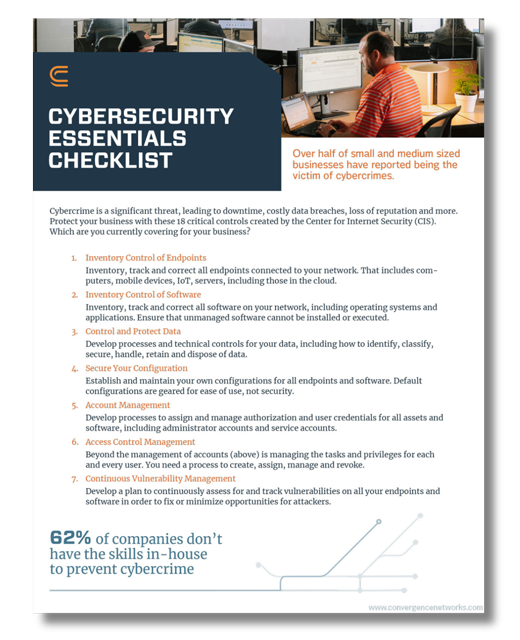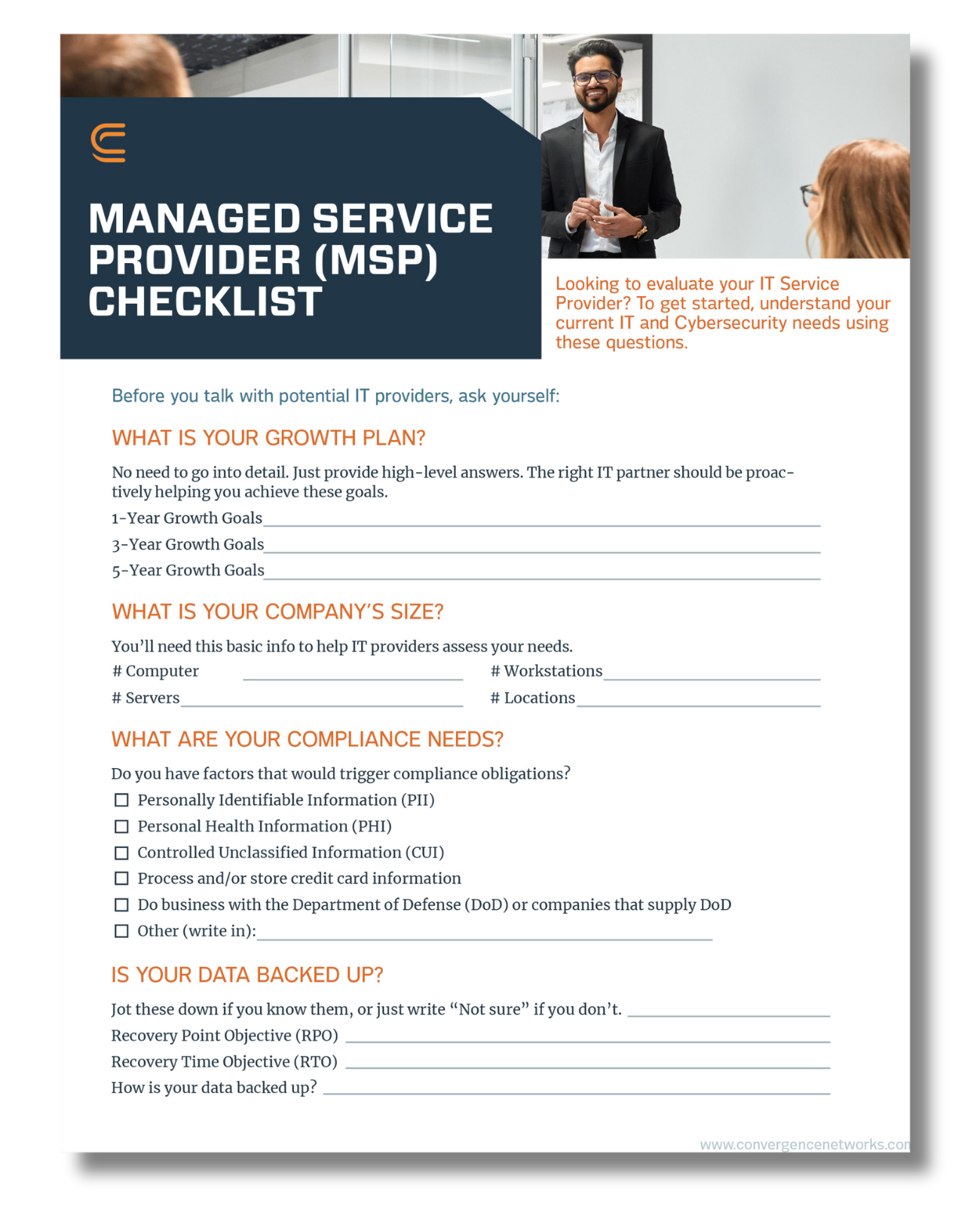Business IT Questions and Answers
Finding the right IT support services for your business can be difficult. That’s why we’ve compiled a list of the most common business IT questions along with our expert answers. While these answers are general, we understand that your business has unique needs. Feel free to contact our experts to discuss your specific IT requirements. In the meantime, we hope you find these business IT questions and answers helpful.
IT FAQs & Answers
Co-managed IT services (or hybrid IT services) is when you use a managed service provider (MSP) to supplement your in-house IT staff. Co-managed IT services can be the best of both worlds if your business is large enough to maintain an in-house IT team. You decide how much you want in-house and what you want from an MSP.
Here’s how it could work:
- Day-to-day business is handled by your in-house IT team with assistance or specialized expertise from your managed service provider as needed.
- Your MSP serves as a virtual chief information security officer or VCISO, basically becoming an outsourced CTO. Your internal IT team manages your systems and implements strategies created under the expert direction of your MSP.
- Your IT leadership is in-house but an outsourced managed IT team executes and manages your systems day to day.
As a set of cybersecurity strategies, IT security works to prevent unauthorized access to an organization’s assets, including its computers, networks and data. IT security maintains the integrity and confidentiality of any sensitive information an organization holds and blocks cybercriminals’ access to that information.
IT security consulting, often referred to as cybersecurity consulting, is a specialized field within the IT industry. It focuses on evaluating the security risks and vulnerabilities of an organization’s computer systems, networks, and software. Security consultants, who might also be called information security consultants, network security consultants, or database security consultants, design and implement tailored solutions to safeguard against cyberattacks and other digital threats.
IT security aims to prevent the loss of:
- Data availability.
- Data integrity.
- Data confidentiality
In fact, 93% of companies that experience a cyber breach have significant losses, from downtime to loss of critical data. As you research IT security further, you’ll discover that most security practices and controls can be traced back to preventing losses in one or more of these areas.
Cyber security services providers offer cyber security to other businesses as a service. Cyber security Service Provider (CSSP) is also a set of specific certifications issued by the Department of Defense (DoD) to designate certain levels of knowledge and experience.
Working with a cyber security provider allows your company to leverage a more robust set of security protocols. They can run tests to find vulnerabilities, monitor networks for intrusions and even respond to incidents. Be aware though: Not all cyber security service providers offer the same set of services and their methods and costs can vary greatly.
A managed cyber security service provider (MSSP) bundles these security services into your managed service agreement for a flat monthly fee. You’ll get proactive monitoring, infrastructure expertise and response and remediation in addition to the help desk, training and other managed service components. The best MSSPs customize their services to meet the needs of your business, so you never pay for services you don’t need.
Here are a few questions to ask any IT security provider you’re considering:
- What is your experience in our industry?
- What compliance frameworks do you have experience with?
- Can you provide case studies or references that demonstrate your success?
- What security-related certifications have you earned?
- Do you have a team of in-house security experts?
- Can you come onsite if needed?
- How do you balance the need for security with operational efficiencies?
- What cybersecurity tools do you use?
- If a cyber incident takes my business offline, can you assist in getting us back up and running?
For more questions to ask, download our free Choose IT Support Checklist.
IT security consultants specialize in protecting organizations’ digital assets and information from cyber threats. Their responsibilities typically include:
- Risk assessment and vulnerability analysis.
- Security strategy and planning.
- Implementation and management of security solutions.
- Security awareness and training.
- Compliance and governance.
- Incident response and remediation.
- Staying up to date with the threat landscape and IT security trends.
Managed IT services involve a proactive approach to handling your company’s technology needs. Instead of reacting to problems as they arise, an MSP monitors, maintains and optimizes your IT systems 24/7/365. You can expect managed IT services to include:
- Network monitoring and security that protects your business from cyber threats with firewalls, antivirus software and proactive threat detection.
- Help desk support that provides expert assistance for your employees when they have technology issues.
- Data backup and disaster recovery to safeguard your critical data and ensure your business can quickly recover in the event of a data loss or system failure.
- Cloud services, which help manage and optimize your cloud infrastructure for better performance and scalability.
- Strategic IT consulting to help you plan and implement technology solutions that align with your business goals.
Think of an MSP as your outsourced IT department, handling everything from day-to-day maintenance to strategic planning, so you can focus on running your business.
Your managed service provider may offer a range of services, such as:
- IT support and helpdesk.
- Strategic IT roadmap development
- IT budgeting
- 24/7 remote monitoring and management.
- IT vendor management.
- Cybersecurity threat detection and response.
- Hardware procurement.
- Cloud migration and management.
- And more.
Yes, small businesses can enjoy a range of benefits from managed IT services, such as:
- Access to expertise: Most small businesses don’t have the budget to hire a full-time IT team with diverse expertise. An MSP gives you access to a team of skilled professionals who specialize in various IT areas.
- Cost savings: Outsourcing IT is often more cost-effective than hiring and training your own staff. Managed IT services are typically provided on a predictable monthly fee, making budgeting easier.
- Proactive support: MSPs proactively monitor your systems to identify and resolve issues before they cause downtime or data loss, helping you avoid costly disruptions.
- Enhanced security: Cybersecurity threats are constantly evolving. MSPs stay up to date on the latest security measures to protect your business from attacks.
- Scalability: As your business grows, an MSP can easily scale its services to meet your changing needs.
Without managed IT services, small businesses may struggle to keep up with technology demands, leaving them vulnerable to security risks and downtime. Partnering with an MSP can level the playing field, giving small businesses the same technological advantages as larger enterprises.
It’s not hard to find managed IT service providers. They come in all shapes and sizes, from the “guy in garage” to large national firms. The key is to choose the right managed service provider to partner with for your business. Here are the hallmarks of a quality IT partner:
- 24/7/365 monitoring and supporting.
- Fast response times and reasonable resolution times based on the level of impact the issue is having on your business.
- A high average customer satisfaction rating (CSAT) over several years and client references to back it up. The higher the rating the better.
- Experience with your type of business or industry (including compliance requirements) and client references to back it up.
- Willing and able to be on site in your offices if needed.
- Flexible contracts. You should be able to cancel all or part of your services with them with 30 days notice. You want a managed service provider that earns your business month after month, not locks you into a long-term contract.
After you pare down your options with the basics, it’s time to find out about their specific IT processes and protocols. Download our Choose IT Support Checklist for more questions to ask potential managed IT service providers.
Outsourcing means getting a job done by an external resource rather than your own employees. When it comes to IT, there are two main ways to do this:
- Project-based outsourcing: This approach involves hiring a vendor or contractor for a specific IT task, like moving to the cloud, providing after-hours help desk or offering a set amount of monthly support. These are often called “break-fix” solutions because they focus on fixing existing problems or filling a particular need. However, they don’t proactively address your overall IT and cybersecurity needs.
- Managed IT services: Partnering with a managed service provider (MSP) is a more comprehensive approach. Beyond project expertise and help desk support, an MSP actively works to prevent problems from occurring in the first place. Think of them as your 24/7 IT team, constantly monitoring and maintaining your network to ensure smooth business operations.











